Unit 3 Could you please tell me where the restrooms are Section B 2a-2e课件(共40张PPT)+内嵌视频
文档属性
| 名称 | Unit 3 Could you please tell me where the restrooms are Section B 2a-2e课件(共40张PPT)+内嵌视频 | 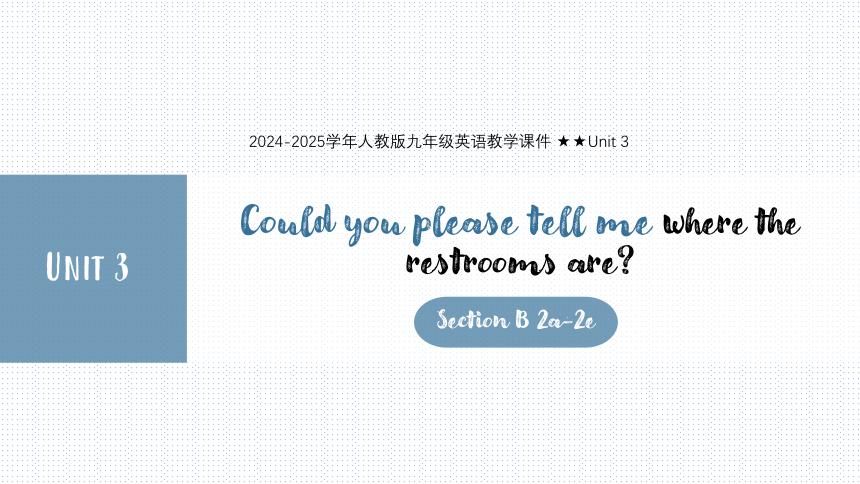 | |
| 格式 | pptx | ||
| 文件大小 | 97.5MB | ||
| 资源类型 | 教案 | ||
| 版本资源 | 人教新目标(Go for it)版 | ||
| 科目 | 英语 | ||
| 更新时间 | 2024-11-01 10:56:03 | ||
图片预览

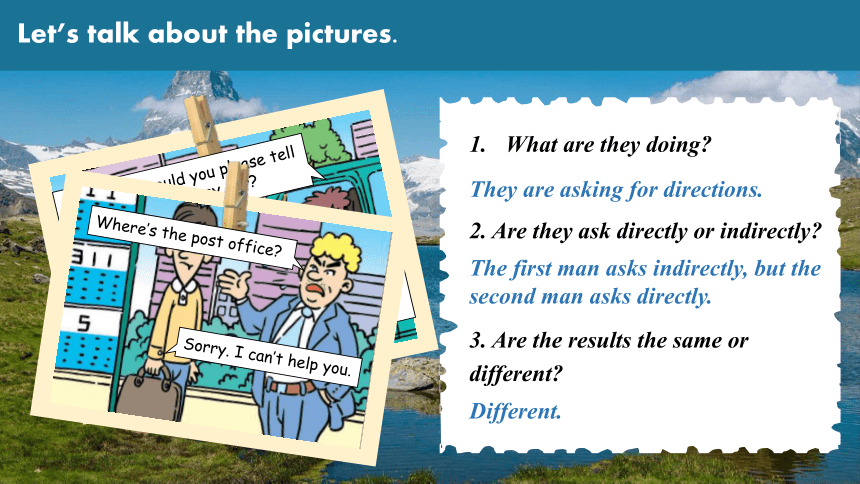

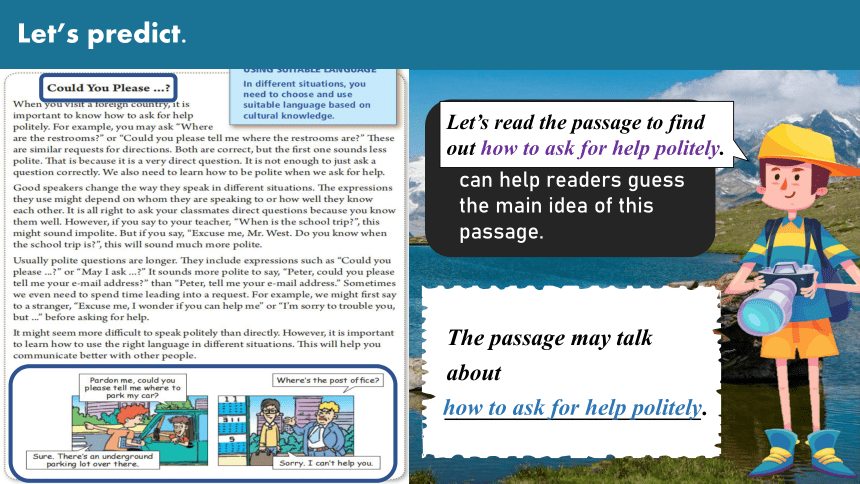
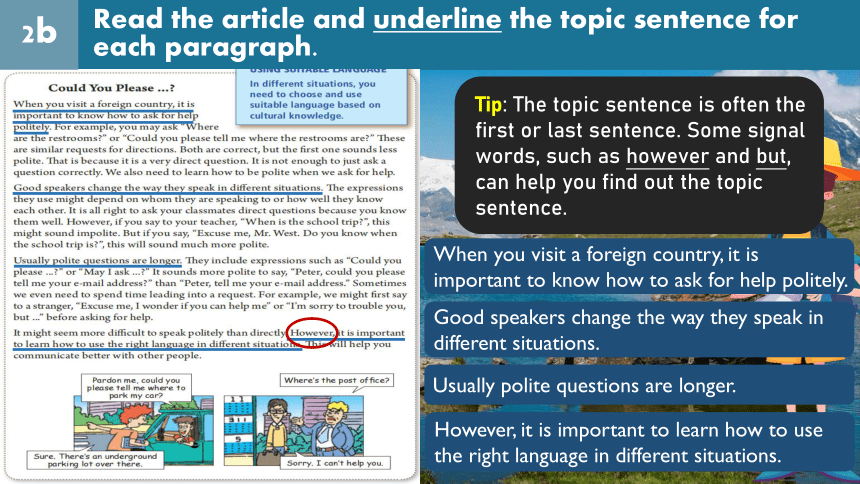
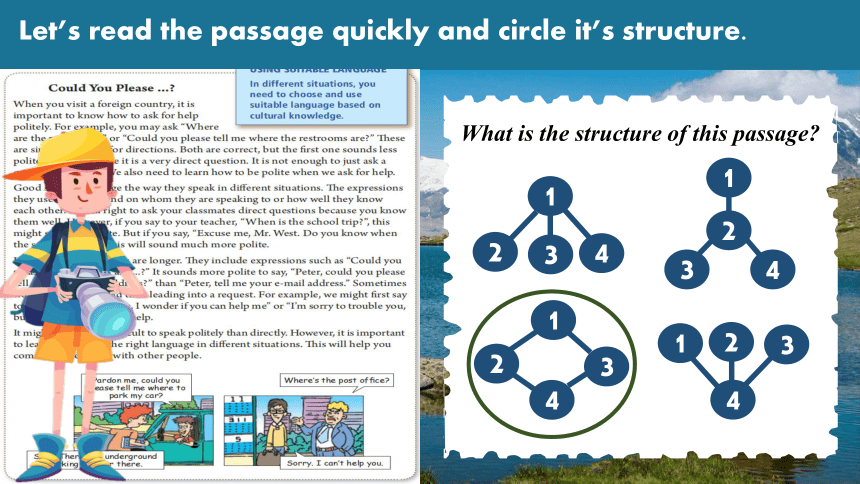
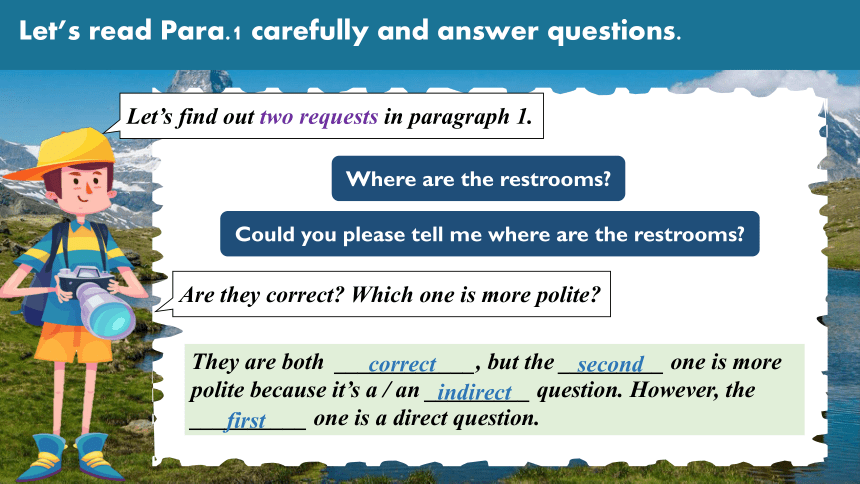

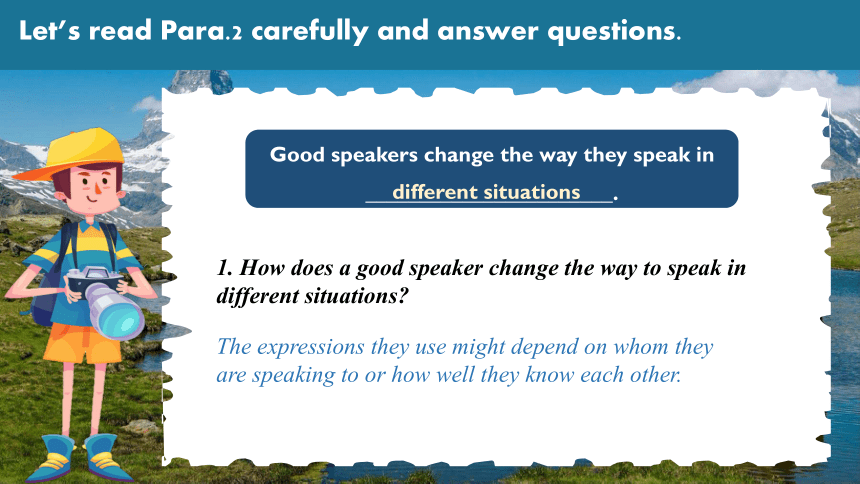
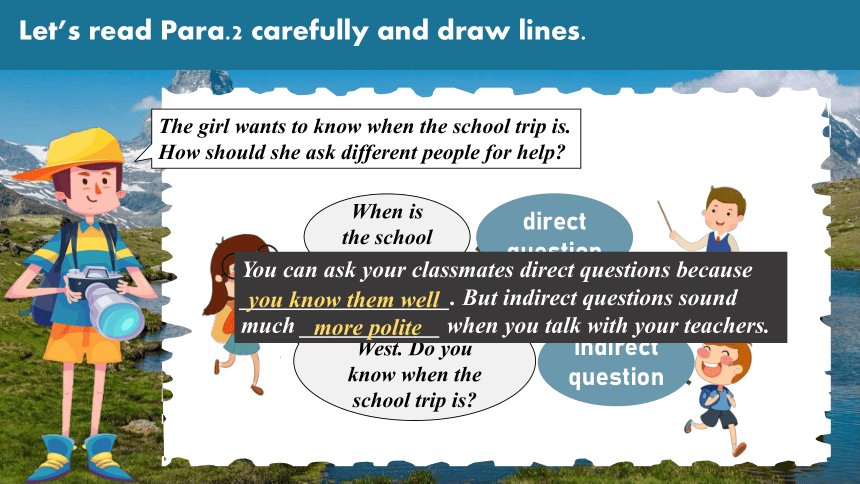
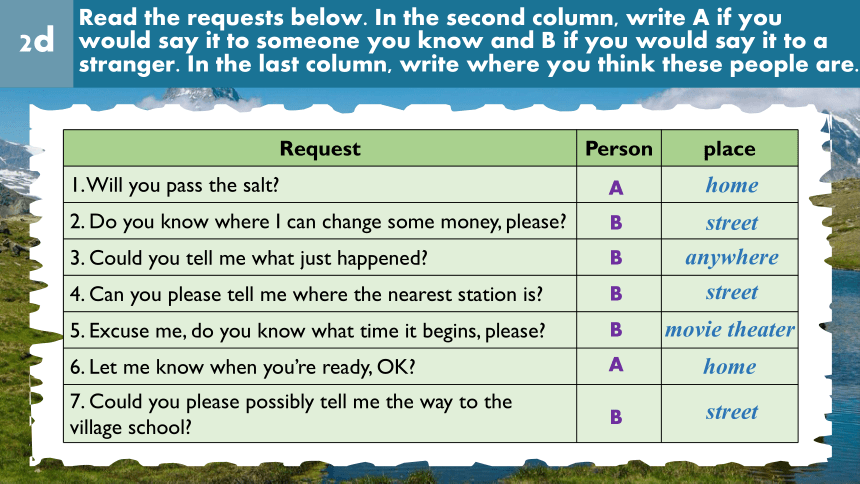
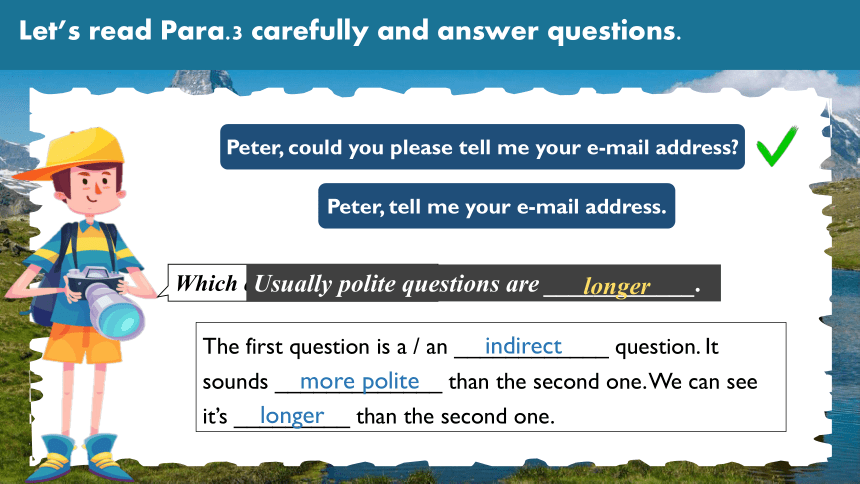
文档简介
(共40张PPT)
Unit 3
Could you please tell me where the restrooms are
Section B 2a-2e
2024-2025学年人教版九年级英语教学课件 ★★Unit 3
Let’s talk about the pictures.
What are they doing
Pardon me, could you please tell me where to park my car
Sure. There’s an underground parking lot over there.
Where’s the post office
Sorry. I can’t help you.
They are asking for directions.
The first man asks indirectly, but the second man asks directly.
Different.
2. Are they ask directly or indirectly
3. Are the results the same or different
Let’s watch a video and discuss.
When we visit a foreign country one day, we may get into trouble. So, it’s important to know how to ask for help ___________.
politely
Let’s predict.
The passage may talk about ______________________.
Tip: The title and the pictures of a passage can help readers guess the main idea of this passage.
how to ask for help politely
Let’s read the passage to find out how to ask for help politely.
Read the article and underline the topic sentence for each paragraph.
2b
Tip: The topic sentence is often the first or last sentence. Some signal words, such as however and but, can help you find out the topic sentence.
When you visit a foreign country, it is important to know how to ask for help politely.
Good speakers change the way they speak in different situations.
Usually polite questions are longer.
However, it is important to learn how to use the right language in different situations.
Let’s read the passage quickly and circle it’s structure.
1
2
3
4
1
2
3
4
1
2
4
3
4
3
2
1
What is the structure of this passage
Let’s read Para.1 carefully and answer questions.
Where are the restrooms
Let’s find out two requests in paragraph 1.
Could you please tell me where are the restrooms
Are they correct Which one is more polite
They are both ____________, but the _________ one is more polite because it’s a / an _________ question. However, the __________ one is a direct question.
correct
second
indirect
first
Let’s read Para.1 carefully and answer questions.
1. What does the writer want to tell by using the “restroom” example
Indirect questions are much longer than direct questions.
Direct questions and indirect questions can be used in different situations.
We should be polite when we ask for help from others.
Indirect questions are better than direct questions.
2. The following paragraph may talk about the _________ to ask for help politely.
ways
transition sentence
Let’s read Para.2 carefully and answer questions.
1. How does a good speaker change the way to speak in different situations
Good speakers change the way they speak in _______________________.
different situations
The expressions they use might depend on whom they are speaking to or how well they know each other.
Let’s read Para.2 carefully and draw lines.
When is the school trip
Excuse me, Mr. West. Do you know when the school trip is
direct question
indirect question
You can ask your classmates direct questions because __________________. But indirect questions sound much ____________ when you talk with your teachers.
you know them well
more polite
The girl wants to know when the school trip is. How should she ask different people for help
Read the requests below. In the second column, write A if you would say it to someone you know and B if you would say it to a stranger. In the last column, write where you think these people are.
2d
Request Person place
1. Will you pass the salt
2. Do you know where I can change some money, please
3. Could you tell me what just happened
4. Can you please tell me where the nearest station is
5. Excuse me, do you know what time it begins, please
6. Let me know when you’re ready, OK
7. Could you please possibly tell me the way to the village school
A
B
B
B
B
A
B
home
street
anywhere
street
movie theater
home
street
Let’s read Para.3 carefully and answer questions.
Peter, could you please tell me your e-mail address
Peter, tell me your e-mail address.
Which one is more polite
The first question is a / an ____________ question. It sounds _____________ than the second one. We can see it’s _________ than the second one.
indirect
more polite
longer
Usually polite questions are ____________.
longer
Let’s read Para.3 carefully and choose the right answer.
1. What may the speaker say after he or she says: “Excuse me, I wonder if you can help me ” or “I’m sorry to trouble you, but…”
If you need it, I will bring it to you tomorrow.
I’d like to buy a mobile phone at the new shopping mall.
Could you please help me to open the window
I can help you with these problems.
These sentences are used to ______________________.
lead into a request
Let’s read Para.4 and answer questions.
1. Speaking politely or directly, which one is more difficult
Speaking politely seems more difficult than speaking directly.
2. What does “this” in paragraph 4 refer to
Speaking politely seems more difficult than speaking directly.
Speaking politely helps us communicate better with others.
Using the right language in different situations is important.
We need to learn to be polite when we ask for help.
Find the direct questions and polite requests from the passage.
2c
Direct questions Polite requests
1. 1.
2. 2.
3. 3.
Where are the restrooms
When is the school trip
Where’s the post office
Excuse me, Mr. West. Do you know when the school trip is
Peter, could you please tell me your e-mail address
Could you please tell me where the restrooms are
How to ask for help politely
Excuse me, do you know…
Pardon me, could you please tell me…
Excuse me, I wonder if you can…
I’m sorry to trouble you, but…
Let’s try.
Please make these requests more polite.
1. Where is the bank
2. Pass me the sugar.
3. When does the play start
Excuse me, could you please tell me where the bank is
Pass me the sugar, please.
Pardon me, I wonder if you know when the play starts
Pay attention to the word order.
Let’s read the passage again and check T for true and F for false.
1. We need to be direct when we ask for help from others.
2. To different people, good speakers may change their way of speaking.
3. “What’s today’s homework ” is a suitable way to ask about homework from your English teacher.
4. It’s a waste of time to lead into a request by using sentences like “Excuse me, I wonder if you can help me ”
5. In the writer’s opinion, it holds great importance that we learn to speak appropriately in different situations.
F
T
F
F
T
Let’s complete the mind map according to the passage.
How to _______________ politely.
Change the way of speaking in ______________
Polite questions are ___________
Whom you are _____________
How well you _____________
Someone you know well
Someone you don’t know well
Direct
_______ and _______
Even need to ________ a request
ask for help
different situations
speaking to
know each other
Indirect
polite
longer
lead into
Learn how to use the __________________ in different situations.
right language
Let’s retell the passage.
When you ask for help, it’s ___________ to be just correct. We also need to know how to be _________.
In _________________, good speakers change the way they speak. The ___________ they use might depend on _______ they are speaking to or how well they _________________. For example, you can ask your classmates __________ questions, but you can’t do that to your teachers.
In general, polite questions are __________. They include expressions such as “Could you please… ” or “ _______________ ” Sometimes we even need to spend time _____________ a request.
It’s important to speak ____________ in different situations. It helps you have a better ________________ with others.
not enough
polite
different situations
expressions
whom
know each other
direct
longer
May I ask…
leading into
rightly
communication
Let’s think.
How to communicate with others politely
Change the way of speaking in different situations
Use longer sentences
Speak softly
Use suitable gestures
Let’s think.
In different situations, we need to choose and use suitable language based on cultural knowledge.
Language points
When you visit a foreign country, it is important _______ (know) how to ask for help ________(polite). For example, you may ask “Where are the restrooms ” or “Could you please tell me ______ the restrooms are ” These are similar requests for ________(direction). Both are correct, but the first one sounds less polite. That is ________ it is a very direct question. It is not enough to just ask a question ________(correct). We also need to learn how to be polite when we ask for help.
adj. 国外的
寻求帮助
adv. 礼貌地
例如
n. 方向
adj. 正确的
sound + adj 听起来怎么样
不那么礼貌
That / This is because… 这/那是因为
adj. 直接的
be (not) enough to do sth. 足够(不够)做某事
adv. 正确地
to know
politely
directions
because
correctly
where
Language points
教材例句:
It is important to know how to ask for help politely.
知道如何礼貌地寻求帮助是很重要的。
polite adj. 礼貌的 — politely adv. 礼貌地
impolite adj. 无礼的 — impolitely adv. 无礼地
The little boy asked me for help politely.
We should not speak to the elderly impolitely.
Mary is polite to her teachers.
It’s polite to open doors for others.
be polite to sb.
“对某人有礼貌”
It's polite to do sth.
“做某事是有礼貌的”
Language points
教材例句:
These are similar requests for directions.
这些是询问方向的类似的请求。
request n. 请求,要求(可数)。其后常接“for + 名词”,意为“……的请求,要求”。
至于该组织本身,它拒绝了采访的要求。
As for the organization itself, it declined a request for an interview.
Language points
request v. 请求,要求
(1)request sth. (from / of sb.) “(向某人)请求某物”。
他向我要了些热水。
He requested some hot water from me.
(2)request sb. to do sth. “请求某人做某事”。
他们要求他立刻离开。
They requested him to leave at once.
(3)request + that从句(从句用虚拟语气,谓语动词用“should +动词原形”,其中should可省略) “请求/要求……”。
我请她早一小时来。
I requested that she (should) come an hour earlier.
Language points
教材例句:
These are similar requests for directions.
这些是询问方向的类似的请求。
direction n. 方向,方位。常与介词in连用。in the direction of… 意为“向着……的方向”。
兔子被巨大的噪音吓得四散奔逃。
Scared by the loud noise, the rabbits ran off in all directions.
direct adj. 直接的 — directly adv. 直接地 — indirect adj. 间接的
direct v. 指导;指路 — direction n. 方向,方位 — director n. 导演
ask for directions 问路;请教,请求指导
follow sb’s directions 听从某人的指教(指示,指挥)
keep sb’s directions in mind 记住某人的指示(指导)
give directions 发出指示 in all directions 四面八方
in every direction 四面八方 in the direction of 朝……方向
Language points
教材例句:
Both are correct, but the first one sounds less polite..
作形容词,意为“正确的;恰当的”,相当于______。
作动词,意为“___________”
__________ adj. 不正确的 __________ adv.正确地;无误地
right
纠正,改正
incorrect
correctly
Can you tell me the _________ answer
It’s time _________ your attitude.
It is ____________ for us to spend too much time on TV.
If I remember __________, he is Bob.
“less+形容词/副词”构成降级比较结构.“不那么,稍许不......”
less + than + 比较的对象
correct
to correct
incorrect
correctly
His second movie is less interesting, I think.
I was less angry than surprised.
Language points
长难句
When you visit a foreign country, it is important
to know how to ask for help politely.
形式主语
when 引导的时间状语从句
动词不定式是真正的主语
how+不定式结构
作know的宾语
Language points
Good _________(speak) change the way they speak in different ________ (situation). The __________(express) they use might depend _____ whom they are speaking to or how well they know each other. It is all right ______ (ask) your classmates direct questions because you know them _____(good). _______, if you say to your teacher, “When is the school trip ”, this might sound impolite. But if you say, “Excuse me, Mr. West. Do you know when the school trip is ”, this will sound much __________ (polite).
n. 发言者;扬声器,喇叭
在不同的情况下
n. 表达,表情
取决于
speak to sb.对某人说
adj. 不礼貌的
speakers
situations
expressions
to ask
well
However
more polite
on
Language points
The expressions they use might depend on
whom they are speaking to or how well they know each other.
难点
长难句
1
谓语
省略了关系词that/which的定语从句,修饰expressions
宾语从句,or连接的并列成分
How well
作从句中的状语
主语
作介词to
的宾语
Language points
Usually polite questions are longer. They include expressions such ___ “Could you please ... ” or “May I ask ... ” It sounds more polite ______(say), “Peter, could you please tell me your e-mail address ” than “Peter, tell me your e-mail address.” Sometimes we even need to spend time _______(lead) into a request. For example, we might first say to a _______(strange) , “Excuse me, I wonder ____ you can help me” or “I’m sorry _________ (trouble) you, but ...” before _______(ask) for help.
v. 包括,包含
例如
邮箱地址
spend time (in) doing sth. 花费时间做某事
lead into 导入
= whether 是否
v. 麻烦
before doing sth. 在做某事之前
as
to say
leading
stranger
if
to trouble
asking
Language points
教材例句:
They include expressions such as “Could you please ... ” or “May I ask ... ” 它们包括像“Could you please ... ”或“May I ask ... ”之类的表达方式。
include v. 包含,包括
The price includes both the house and the furniture inside.
这个价格包括房子和里面的家具。
including prep. 包括、包含在内。后接名词、代词或动词-ing形式。
Six people, including a baby, were injured in the accident.
事故中有6人受伤,其中包括一名婴儿。
included adj. 包括在内的。通常置于名词之后。
Many runners, myself included, are loners.
包括我本人在内的许多赛跑选手都是喜欢独来独往的人。
Language points
教材例句:
Sometimes we even need to spend time leading into a request.
有时,我们甚至需要花些时间来导入一个请求。
v. lead 带领 lead into 导入
我们常用 “excuse me”来导入一个请求。
We often use “excuse me” to lead into a request.
v. lead 带领 lead to 导致
过量的工作和过少的休息经常导致疾病。
Too much work and too little rest often lead to illness.
Language points
教材例句:
Sometimes we even need to spend time leading into a request.
有时,我们甚至需要花些时间来导入一个请求。
v. Spend v.花费(spend-spent-spent)
spend… doing sth. 花费……做某事
(1)spend+时间/金钱+(in)doing sth.
(2)spend+时间/金钱+on sth.
(1) + spend+ / +on sth. /(in)doing sth.
(2) +pay+ +for sth.
(3)sth. +cost+ +
(4)It takes+ / +to do sth.
The girl spent most of her pocket money buying magazines.
v. 如何表达“花费”
Language points
教材例句:
I’m sorry to trouble you.
我很抱歉打扰你。
trouble v. 打扰,麻烦
我不想为了这个小毛病麻烦医生
I don’t want to trouble the doctor with such a small problem.
。
trouble n. 麻烦(不可数)
短语:have trouble (in) doing sth. 做某事有困难
我们在山顶呼吸困难。
We have trouble (in) breathing on the top of the mountain.
get into trouble 陷入困境
be in trouble 处于困境中
get out of trouble 摆脱困境
Language points
It might seem _____________ (difficult) to speak politely than directly. However, it is important to learn how _______ (use)the right language in different situations. This will also help you communicate better ____ other people.
adv. 礼貌地
v. 似乎,看来
adv. 直接地
adj. 正确的
communicate with sb. 和某人交流
communication n. 沟通,交流
more difficult
to use
with
Exercises: 单项选择。
1. Allen always behaves ________, so many people like him.
A. easily B. friendly C. politely D. lively
2. — With _____ does he live
— He lives with his sister in a small house.
A. who B. where C. whom D. what
3. All the students are requested _______ the school celebration.
A. attend B. to attend C. attending D. attended
4. Could you please help me to ________ the mistakes
A. depend B. correct C. suggest D. pass
5. That gives me the courage to make a ________.
A. request B. require C. need D. beg
Exercises: 根据汉语意思完成下列句子。
1. 我想知道去郊区的路。
I want to know ____ ______ ______ the suburbs.
2. 在那个时候,他别无选择,只能依靠自己。
He had no choice but to __________ ____ himself at that time.
3. 在这个停车场你可以看到各种各样的汽车。
You can see all kinds of cars in this __________ ______.
4. 我们必须学会如何在困境中求助。
We must learn how to ask for help when ______ ____ ________.
5. 好像没有人知道这个问题的正确答案。
It _______ ______ nobody knows the right answer to this question.
the way to
depend on
parking lot
we’re in trouble
seems that
Exercises: 根据汉语意思完成下列句子。
6. 我们可以把这个话题引入一场热烈的讨论中。
We can ______ this topic ______ a heated discussion.
7. 学会如何礼貌地请求帮助是很重要的。
It’s important _______ _______ how to _______ _______ help politely.
8. 打扰一下,你知道我在哪里能买到一些杂志吗
Excuse me, do you know _______ _______ _______ _______ some magazines
9. 我们在不同的情境中和不同的人说话时应改变我们谈话的方式。
We should _______ _______ _______ we talk when we speak with different people in ____________ __________.
lead into
to learn
ask for
where I can buy
change the way
different situations
Unit 3
Thank you for your listening
Section B 2a-2e
Unit 3
Could you please tell me where the restrooms are
Section B 2a-2e
2024-2025学年人教版九年级英语教学课件 ★★Unit 3
Let’s talk about the pictures.
What are they doing
Pardon me, could you please tell me where to park my car
Sure. There’s an underground parking lot over there.
Where’s the post office
Sorry. I can’t help you.
They are asking for directions.
The first man asks indirectly, but the second man asks directly.
Different.
2. Are they ask directly or indirectly
3. Are the results the same or different
Let’s watch a video and discuss.
When we visit a foreign country one day, we may get into trouble. So, it’s important to know how to ask for help ___________.
politely
Let’s predict.
The passage may talk about ______________________.
Tip: The title and the pictures of a passage can help readers guess the main idea of this passage.
how to ask for help politely
Let’s read the passage to find out how to ask for help politely.
Read the article and underline the topic sentence for each paragraph.
2b
Tip: The topic sentence is often the first or last sentence. Some signal words, such as however and but, can help you find out the topic sentence.
When you visit a foreign country, it is important to know how to ask for help politely.
Good speakers change the way they speak in different situations.
Usually polite questions are longer.
However, it is important to learn how to use the right language in different situations.
Let’s read the passage quickly and circle it’s structure.
1
2
3
4
1
2
3
4
1
2
4
3
4
3
2
1
What is the structure of this passage
Let’s read Para.1 carefully and answer questions.
Where are the restrooms
Let’s find out two requests in paragraph 1.
Could you please tell me where are the restrooms
Are they correct Which one is more polite
They are both ____________, but the _________ one is more polite because it’s a / an _________ question. However, the __________ one is a direct question.
correct
second
indirect
first
Let’s read Para.1 carefully and answer questions.
1. What does the writer want to tell by using the “restroom” example
Indirect questions are much longer than direct questions.
Direct questions and indirect questions can be used in different situations.
We should be polite when we ask for help from others.
Indirect questions are better than direct questions.
2. The following paragraph may talk about the _________ to ask for help politely.
ways
transition sentence
Let’s read Para.2 carefully and answer questions.
1. How does a good speaker change the way to speak in different situations
Good speakers change the way they speak in _______________________.
different situations
The expressions they use might depend on whom they are speaking to or how well they know each other.
Let’s read Para.2 carefully and draw lines.
When is the school trip
Excuse me, Mr. West. Do you know when the school trip is
direct question
indirect question
You can ask your classmates direct questions because __________________. But indirect questions sound much ____________ when you talk with your teachers.
you know them well
more polite
The girl wants to know when the school trip is. How should she ask different people for help
Read the requests below. In the second column, write A if you would say it to someone you know and B if you would say it to a stranger. In the last column, write where you think these people are.
2d
Request Person place
1. Will you pass the salt
2. Do you know where I can change some money, please
3. Could you tell me what just happened
4. Can you please tell me where the nearest station is
5. Excuse me, do you know what time it begins, please
6. Let me know when you’re ready, OK
7. Could you please possibly tell me the way to the village school
A
B
B
B
B
A
B
home
street
anywhere
street
movie theater
home
street
Let’s read Para.3 carefully and answer questions.
Peter, could you please tell me your e-mail address
Peter, tell me your e-mail address.
Which one is more polite
The first question is a / an ____________ question. It sounds _____________ than the second one. We can see it’s _________ than the second one.
indirect
more polite
longer
Usually polite questions are ____________.
longer
Let’s read Para.3 carefully and choose the right answer.
1. What may the speaker say after he or she says: “Excuse me, I wonder if you can help me ” or “I’m sorry to trouble you, but…”
If you need it, I will bring it to you tomorrow.
I’d like to buy a mobile phone at the new shopping mall.
Could you please help me to open the window
I can help you with these problems.
These sentences are used to ______________________.
lead into a request
Let’s read Para.4 and answer questions.
1. Speaking politely or directly, which one is more difficult
Speaking politely seems more difficult than speaking directly.
2. What does “this” in paragraph 4 refer to
Speaking politely seems more difficult than speaking directly.
Speaking politely helps us communicate better with others.
Using the right language in different situations is important.
We need to learn to be polite when we ask for help.
Find the direct questions and polite requests from the passage.
2c
Direct questions Polite requests
1. 1.
2. 2.
3. 3.
Where are the restrooms
When is the school trip
Where’s the post office
Excuse me, Mr. West. Do you know when the school trip is
Peter, could you please tell me your e-mail address
Could you please tell me where the restrooms are
How to ask for help politely
Excuse me, do you know…
Pardon me, could you please tell me…
Excuse me, I wonder if you can…
I’m sorry to trouble you, but…
Let’s try.
Please make these requests more polite.
1. Where is the bank
2. Pass me the sugar.
3. When does the play start
Excuse me, could you please tell me where the bank is
Pass me the sugar, please.
Pardon me, I wonder if you know when the play starts
Pay attention to the word order.
Let’s read the passage again and check T for true and F for false.
1. We need to be direct when we ask for help from others.
2. To different people, good speakers may change their way of speaking.
3. “What’s today’s homework ” is a suitable way to ask about homework from your English teacher.
4. It’s a waste of time to lead into a request by using sentences like “Excuse me, I wonder if you can help me ”
5. In the writer’s opinion, it holds great importance that we learn to speak appropriately in different situations.
F
T
F
F
T
Let’s complete the mind map according to the passage.
How to _______________ politely.
Change the way of speaking in ______________
Polite questions are ___________
Whom you are _____________
How well you _____________
Someone you know well
Someone you don’t know well
Direct
_______ and _______
Even need to ________ a request
ask for help
different situations
speaking to
know each other
Indirect
polite
longer
lead into
Learn how to use the __________________ in different situations.
right language
Let’s retell the passage.
When you ask for help, it’s ___________ to be just correct. We also need to know how to be _________.
In _________________, good speakers change the way they speak. The ___________ they use might depend on _______ they are speaking to or how well they _________________. For example, you can ask your classmates __________ questions, but you can’t do that to your teachers.
In general, polite questions are __________. They include expressions such as “Could you please… ” or “ _______________ ” Sometimes we even need to spend time _____________ a request.
It’s important to speak ____________ in different situations. It helps you have a better ________________ with others.
not enough
polite
different situations
expressions
whom
know each other
direct
longer
May I ask…
leading into
rightly
communication
Let’s think.
How to communicate with others politely
Change the way of speaking in different situations
Use longer sentences
Speak softly
Use suitable gestures
Let’s think.
In different situations, we need to choose and use suitable language based on cultural knowledge.
Language points
When you visit a foreign country, it is important _______ (know) how to ask for help ________(polite). For example, you may ask “Where are the restrooms ” or “Could you please tell me ______ the restrooms are ” These are similar requests for ________(direction). Both are correct, but the first one sounds less polite. That is ________ it is a very direct question. It is not enough to just ask a question ________(correct). We also need to learn how to be polite when we ask for help.
adj. 国外的
寻求帮助
adv. 礼貌地
例如
n. 方向
adj. 正确的
sound + adj 听起来怎么样
不那么礼貌
That / This is because… 这/那是因为
adj. 直接的
be (not) enough to do sth. 足够(不够)做某事
adv. 正确地
to know
politely
directions
because
correctly
where
Language points
教材例句:
It is important to know how to ask for help politely.
知道如何礼貌地寻求帮助是很重要的。
polite adj. 礼貌的 — politely adv. 礼貌地
impolite adj. 无礼的 — impolitely adv. 无礼地
The little boy asked me for help politely.
We should not speak to the elderly impolitely.
Mary is polite to her teachers.
It’s polite to open doors for others.
be polite to sb.
“对某人有礼貌”
It's polite to do sth.
“做某事是有礼貌的”
Language points
教材例句:
These are similar requests for directions.
这些是询问方向的类似的请求。
request n. 请求,要求(可数)。其后常接“for + 名词”,意为“……的请求,要求”。
至于该组织本身,它拒绝了采访的要求。
As for the organization itself, it declined a request for an interview.
Language points
request v. 请求,要求
(1)request sth. (from / of sb.) “(向某人)请求某物”。
他向我要了些热水。
He requested some hot water from me.
(2)request sb. to do sth. “请求某人做某事”。
他们要求他立刻离开。
They requested him to leave at once.
(3)request + that从句(从句用虚拟语气,谓语动词用“should +动词原形”,其中should可省略) “请求/要求……”。
我请她早一小时来。
I requested that she (should) come an hour earlier.
Language points
教材例句:
These are similar requests for directions.
这些是询问方向的类似的请求。
direction n. 方向,方位。常与介词in连用。in the direction of… 意为“向着……的方向”。
兔子被巨大的噪音吓得四散奔逃。
Scared by the loud noise, the rabbits ran off in all directions.
direct adj. 直接的 — directly adv. 直接地 — indirect adj. 间接的
direct v. 指导;指路 — direction n. 方向,方位 — director n. 导演
ask for directions 问路;请教,请求指导
follow sb’s directions 听从某人的指教(指示,指挥)
keep sb’s directions in mind 记住某人的指示(指导)
give directions 发出指示 in all directions 四面八方
in every direction 四面八方 in the direction of 朝……方向
Language points
教材例句:
Both are correct, but the first one sounds less polite..
作形容词,意为“正确的;恰当的”,相当于______。
作动词,意为“___________”
__________ adj. 不正确的 __________ adv.正确地;无误地
right
纠正,改正
incorrect
correctly
Can you tell me the _________ answer
It’s time _________ your attitude.
It is ____________ for us to spend too much time on TV.
If I remember __________, he is Bob.
“less+形容词/副词”构成降级比较结构.“不那么,稍许不......”
less + than + 比较的对象
correct
to correct
incorrect
correctly
His second movie is less interesting, I think.
I was less angry than surprised.
Language points
长难句
When you visit a foreign country, it is important
to know how to ask for help politely.
形式主语
when 引导的时间状语从句
动词不定式是真正的主语
how+不定式结构
作know的宾语
Language points
Good _________(speak) change the way they speak in different ________ (situation). The __________(express) they use might depend _____ whom they are speaking to or how well they know each other. It is all right ______ (ask) your classmates direct questions because you know them _____(good). _______, if you say to your teacher, “When is the school trip ”, this might sound impolite. But if you say, “Excuse me, Mr. West. Do you know when the school trip is ”, this will sound much __________ (polite).
n. 发言者;扬声器,喇叭
在不同的情况下
n. 表达,表情
取决于
speak to sb.对某人说
adj. 不礼貌的
speakers
situations
expressions
to ask
well
However
more polite
on
Language points
The expressions they use might depend on
whom they are speaking to or how well they know each other.
难点
长难句
1
谓语
省略了关系词that/which的定语从句,修饰expressions
宾语从句,or连接的并列成分
How well
作从句中的状语
主语
作介词to
的宾语
Language points
Usually polite questions are longer. They include expressions such ___ “Could you please ... ” or “May I ask ... ” It sounds more polite ______(say), “Peter, could you please tell me your e-mail address ” than “Peter, tell me your e-mail address.” Sometimes we even need to spend time _______(lead) into a request. For example, we might first say to a _______(strange) , “Excuse me, I wonder ____ you can help me” or “I’m sorry _________ (trouble) you, but ...” before _______(ask) for help.
v. 包括,包含
例如
邮箱地址
spend time (in) doing sth. 花费时间做某事
lead into 导入
= whether 是否
v. 麻烦
before doing sth. 在做某事之前
as
to say
leading
stranger
if
to trouble
asking
Language points
教材例句:
They include expressions such as “Could you please ... ” or “May I ask ... ” 它们包括像“Could you please ... ”或“May I ask ... ”之类的表达方式。
include v. 包含,包括
The price includes both the house and the furniture inside.
这个价格包括房子和里面的家具。
including prep. 包括、包含在内。后接名词、代词或动词-ing形式。
Six people, including a baby, were injured in the accident.
事故中有6人受伤,其中包括一名婴儿。
included adj. 包括在内的。通常置于名词之后。
Many runners, myself included, are loners.
包括我本人在内的许多赛跑选手都是喜欢独来独往的人。
Language points
教材例句:
Sometimes we even need to spend time leading into a request.
有时,我们甚至需要花些时间来导入一个请求。
v. lead 带领 lead into 导入
我们常用 “excuse me”来导入一个请求。
We often use “excuse me” to lead into a request.
v. lead 带领 lead to 导致
过量的工作和过少的休息经常导致疾病。
Too much work and too little rest often lead to illness.
Language points
教材例句:
Sometimes we even need to spend time leading into a request.
有时,我们甚至需要花些时间来导入一个请求。
v. Spend v.花费(spend-spent-spent)
spend… doing sth. 花费……做某事
(1)spend+时间/金钱+(in)doing sth.
(2)spend+时间/金钱+on sth.
(1) + spend+ / +on sth. /(in)doing sth.
(2) +pay+ +for sth.
(3)sth. +cost+ +
(4)It takes+ / +to do sth.
The girl spent most of her pocket money buying magazines.
v. 如何表达“花费”
Language points
教材例句:
I’m sorry to trouble you.
我很抱歉打扰你。
trouble v. 打扰,麻烦
我不想为了这个小毛病麻烦医生
I don’t want to trouble the doctor with such a small problem.
。
trouble n. 麻烦(不可数)
短语:have trouble (in) doing sth. 做某事有困难
我们在山顶呼吸困难。
We have trouble (in) breathing on the top of the mountain.
get into trouble 陷入困境
be in trouble 处于困境中
get out of trouble 摆脱困境
Language points
It might seem _____________ (difficult) to speak politely than directly. However, it is important to learn how _______ (use)the right language in different situations. This will also help you communicate better ____ other people.
adv. 礼貌地
v. 似乎,看来
adv. 直接地
adj. 正确的
communicate with sb. 和某人交流
communication n. 沟通,交流
more difficult
to use
with
Exercises: 单项选择。
1. Allen always behaves ________, so many people like him.
A. easily B. friendly C. politely D. lively
2. — With _____ does he live
— He lives with his sister in a small house.
A. who B. where C. whom D. what
3. All the students are requested _______ the school celebration.
A. attend B. to attend C. attending D. attended
4. Could you please help me to ________ the mistakes
A. depend B. correct C. suggest D. pass
5. That gives me the courage to make a ________.
A. request B. require C. need D. beg
Exercises: 根据汉语意思完成下列句子。
1. 我想知道去郊区的路。
I want to know ____ ______ ______ the suburbs.
2. 在那个时候,他别无选择,只能依靠自己。
He had no choice but to __________ ____ himself at that time.
3. 在这个停车场你可以看到各种各样的汽车。
You can see all kinds of cars in this __________ ______.
4. 我们必须学会如何在困境中求助。
We must learn how to ask for help when ______ ____ ________.
5. 好像没有人知道这个问题的正确答案。
It _______ ______ nobody knows the right answer to this question.
the way to
depend on
parking lot
we’re in trouble
seems that
Exercises: 根据汉语意思完成下列句子。
6. 我们可以把这个话题引入一场热烈的讨论中。
We can ______ this topic ______ a heated discussion.
7. 学会如何礼貌地请求帮助是很重要的。
It’s important _______ _______ how to _______ _______ help politely.
8. 打扰一下,你知道我在哪里能买到一些杂志吗
Excuse me, do you know _______ _______ _______ _______ some magazines
9. 我们在不同的情境中和不同的人说话时应改变我们谈话的方式。
We should _______ _______ _______ we talk when we speak with different people in ____________ __________.
lead into
to learn
ask for
where I can buy
change the way
different situations
Unit 3
Thank you for your listening
Section B 2a-2e
同课章节目录
- Unit 1 How can we become good learners.
- Section A
- Section B
- Unit 2 I think that mooncakes are delicious!
- Section A
- Section B
- Unit 3 Could you please tell me where the restroom
- Section A
- Section B
- Unit 4 I used to be afraid of the dark.
- Section A
- Section B
- Unit 5 What are the shirts made of?
- Section A
- Section B
- Review of Units 1-5
- Unit 6 When was it invented?
- Section A
- Section B
- Unit 7 Teenagers should be allowed to choose their
- Section A
- Section B
- Unit 8 It must belong to Carla.
- Section A
- Section B
- Unit 9 I like music that I can dance to.
- Section A
- Section B
- Unit 10 You're supposed to shake hands.
- Section A
- Section B
- Review of Units 6-10
- Unit 11 Sad movies make me cry.
- Section A
- Section B
- Unit 12 Life is full of the unexpected
- Section A
- Section B
- Unit 13 We're trying to save the earth!
- Section A
- Section B
- Unit 14 I remember meeting all of you in Grade 7.
- Section A
- Section B
- Review of Units 11-14
